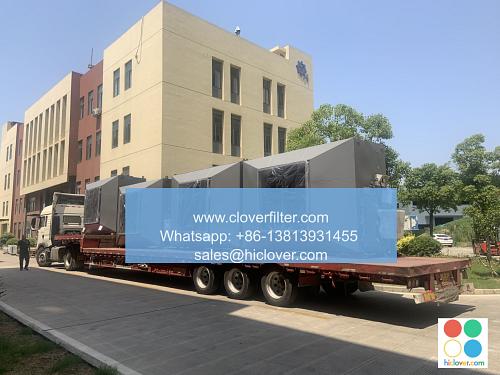Breathing Easy: How Automatic Roll Air Filters Improve Air Quality in Maple Leaf Foods Meat Processing Plants

The meat processing industry is a complex and highly regulated sector that requires strict control over air quality to ensure the health and safety of employees, as well as the quality of the products being processed. Maple Leaf Foods, a leading Canadian meat processing company, has implemented cutting-edge technology to improve air quality in their plants. One key solution is the use of automatic roll air filters, which have revolutionized the way the company approaches indoor air quality (IAQ), air purification, and ventilation system management.
The Challenge of Air Quality in Meat Processing Plants
Meat processing plants present unique air quality challenges, including high levels of particulate matter (PM), volatile organic compounds (VOCs), and microbial contaminants. These airborne pollutants can come from various sources, such as animal by-products, cleaning agents, and microbial growth on equipment and surfaces. If left uncontrolled, these pollutants can compromise worker health and safety, product quality, and regulatory compliance. Moreover, poor air quality can also lead to equipment corrosion, maintenance issues, and energy efficiency problems.
The Solution: Automatic Roll Air Filters
To address these challenges, Maple Leaf Foods has installed automatic roll air filters in their meat processing plants. These advanced filters use a continuous roll of filter media that automatically advances to a new, clean section as the old section becomes dirty. This self-cleaning mechanism ensures that the filters maintain optimal air cleaning efficiency and capture rate for particulate matter, VOCs, and microbial contaminants. The benefits of automatic roll air filters include:
* Improved IAQ: By capturing airborne pollutants, automatic roll air filters help maintain a healthy and safe indoor environment for employees.
* Enhanced product quality: By reducing microbial and particulate contamination, automatic roll air filters help ensure the quality and safety of meat products.
* Increased energy efficiency: By minimizing static pressure and air resistance, automatic roll air filters can help reduce energy consumption and operating costs.
* Reduced maintenance: The self-cleaning mechanism of automatic roll air filters reduces the need for manual maintenance and filter replacements.
Application Areas for Automatic Roll Air Filters
Automatic roll air filters have a wide range of applications in meat processing plants, including:
* Raw material processing: Automatic roll air filters can be used to control dust and particulate matter generated during raw material processing, such as grinding, cutting, and mixing.
* Product packaging: Automatic roll air filters can be used to maintain a clean and microbe-free environment during product packaging, reducing the risk of contamination and product spoilage.
* Cooking and smoking: Automatic roll air filters can be used to control VOCs and particulate matter generated during cooking and smoking processes, improving IAQ and reducing the risk of fire hazards.
* Waste management: Automatic roll air filters can be used to control odors and particulate matter generated during waste management processes, reducing the risk of environmental pollution and regulatory non-compliance.
Conclusion
In conclusion, automatic roll air filters have proven to be a highly effective solution for improving air quality in Maple Leaf Foods meat processing plants. By providing a continuous, self-cleaning filter media, these advanced filters help maintain optimal IAQ, product quality, and regulatory compliance. With their wide range of applications in meat processing plants, automatic roll air filters are an essential tool for ensuring a healthy, safe, and environmentally responsible food processing operation. As the meat processing industry continues to evolve, the use of automatic roll air filters is likely to become an increasingly important aspect of air quality management and sustainability initiatives.

